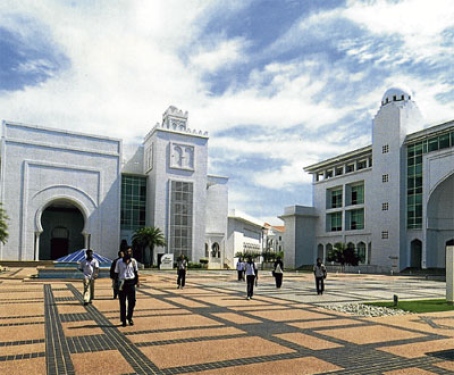Challenges of a model university
Professor Tan Sri Dato' Dzulkifli Abdul Razak
Learning Curve: Perspective
New Sunday Times - 25-11-2012
VISIONARY: A new template for democratising higher education
AS I complete my first year in my new role at Albukhary International University (AiU) in Alor Star, Kedah Syed Mokhtar Albukhary: A Biography was launched. It is a timely and welcome event especially to the university community as the higher education institution is the brainchild of Tan Sri Syed Mokhtar Albukhary, who is founder and benefactor.

Albukhary International University
Since its inception, the tertiary institution is not known to the public, even to the people of Alor Star. Faculty members often jest that it is the city's best-kept secret because like the founder-benefactor, the university has a very low profile for a number of reasons. Foremost, it is a new entrant to the complex world of higher education in Malaysia and in many ways it is unlike a conventional university -- at least not like the one that I used to serve.
For starters, this is an institution based on the waqf (benefaction) concept which is pro-poor. Students come from a humble socio-economic background. But they are rich in many ways as they represent 50 -- and counting -- nationalities from underprivileged communities around the world.
It is truly an international university as some 80 per cent of its students are not from Malaysia, marking another significant departure from several "international" counterparts that exist today. The campus is a global potpourri of cultures which undoubtedly provides a rich environment conducive to learning beyond teaching in a formal classroom.
The university lays emphasis on the development of the whole person. Its vision is explicit in stating that it is "characterised by high quality education and humanitarian values aimed at empowering underprivileged and disadvantaged students". Its mission is equally clear: "Provide academically qualified students from underprivileged and disadvantaged backgrounds not only quality education for them to succeed in life, but also an education which will result in their valuing discipline, being caring and giving individuals."
"Caring and giving" are indeed key elements that the university wants to nurture. It differentiates itself by bringing back the true ethos of a university that not too long ago is not only part of the community, but also organically rooted in shaping and learning from it. This was the days before the Industrial Age when tertiary institutions were eventually "absorbed" as human factories producing human "goods" (some called it human capital) as it is today. The human person is left out as "education" turns into a big business that generally depends on you buying more!
Therein lies the challenge to be "a model university" as articulated in its vision statement within the realm of humanity and human dignity. Hence, the concept of a "humaniversity" that centres on universal human values and interactions as the platform of learning and co-creating knowledge that bring to life the four pillars of learning -- learning to do, learning to know, learning to be and learning to live together -- as advocated by United Nations Educational, Scientific and Cultural Organisation. Sadly, as universities become factories, the last two pillars are rarely articulated as an essential part of learning, though they are important prerequisite for the first two dimensions.
At AiU, the four elements are consolidated on a specifically designed Humaniversity Competency Framework Model that allows for the advancement of academia and socio-behavioural development as an integral part of the core curriculum for the entire study period. This model is yet another feature that combines the three aspects of academic relevance, social engagement and recreationally enriching experiences that anchor the university.
In short, as we move into the post-industrial and post-materialist society where knowledge is vital to level the quality of human life, the current education model that generally favours the "haves" and the "best and brightest" is inherently defective as the majority of the world's population is deprived of the right to meaningful education. The reality is that only one person in a global village of 100 gets a university education. This makes the so-called democratisation of higher education a farce!
In this context, Syed Mokhtar's bold foresight to create another world view of higher education is certainly unusual, and a courageous one in the name of humanity. Failure is not an option!
- The writer is the vice-chancellor of Albukhary International University
